The temporary’s key findings are:
- The employment charge for employees ages 51-64 with a incapacity is considerably above the pre-COVID stage.
- Almost the entire employment acquire was in teleworkable jobs, even after accounting for different components that may have an effect on work exercise.
- The supply of teleworkable jobs inspired some to reenter the labor power and others to modify to distant jobs as a substitute of exiting the labor power.
- Whether or not these results will persist stays unclear, as distant work choices may decline because the labor market returns to extra regular circumstances.
Introduction
One side of the pandemic that has endured is the elevated relevance of distant work. This shift may assist older folks with disabilities, who may in any other case discover it arduous to get or hold jobs. Certainly, this group has a better employment charge post-pandemic than pre-pandemic.
Distant work, although, won’t be the one issue contributing to this pattern. First, extra folks report having a work-limiting impairment than earlier than the pandemic. If these new well being circumstances are comparatively delicate, then the rising prevalence of incapacity, by itself, may result in a better employment charge amongst this group. Second, the labor market has been extraordinarily tight in recent times, which may additionally assist enhance employment charges amongst these with disabilities.
This temporary, based mostly on a brand new examine, examines the extent to which distant work has contributed to the rising employment charge of older people with disabilities and which varieties of these employees – based mostly on their current work historical past – have benefited essentially the most.1 The dialogue proceeds as follows. The primary part supplies background on the rise of distant work, employment developments for older folks with disabilities, and the 2 different components that may very well be enjoying a task: the rising prevalence of incapacity and the tight labor market. The second part introduces the information and methodology for the evaluation. The third part presents the outcomes. The ultimate part concludes that distant work has elevated employment amongst older employees with disabilities by encouraging some to reenter the labor power and others to modify to distant work as a substitute of exiting the labor power.
Background
A hanging function of the pandemic was the sudden shift in direction of distant work, and distant work stays a fixture within the labor market (see Determine 1). For employees with disabilities, distant work lowers the fastened price of getting a job by decreasing commuting bills, offering larger flexibility, and doubtlessly permitting them to entry the nationwide labor market.2 For employers, distant jobs can scale back the prices of hiring as a result of required lodging are already out there within the employee’s residence.3
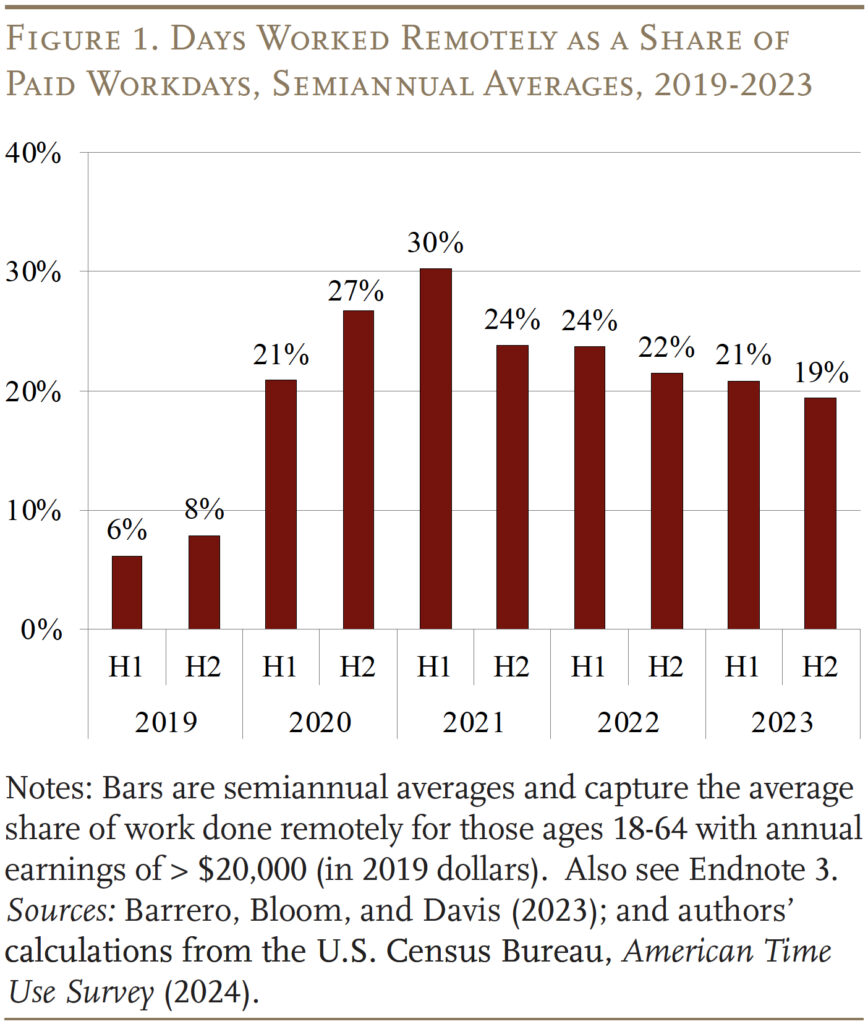
The notion that distant work could also be serving to older employees with disabilities keep within the labor power is supported by current employment developments. Determine 2 exhibits that the employment charge for this group rebounded quickly after the pandemic, even rising above pre-pandemic ranges starting in late 2021.4
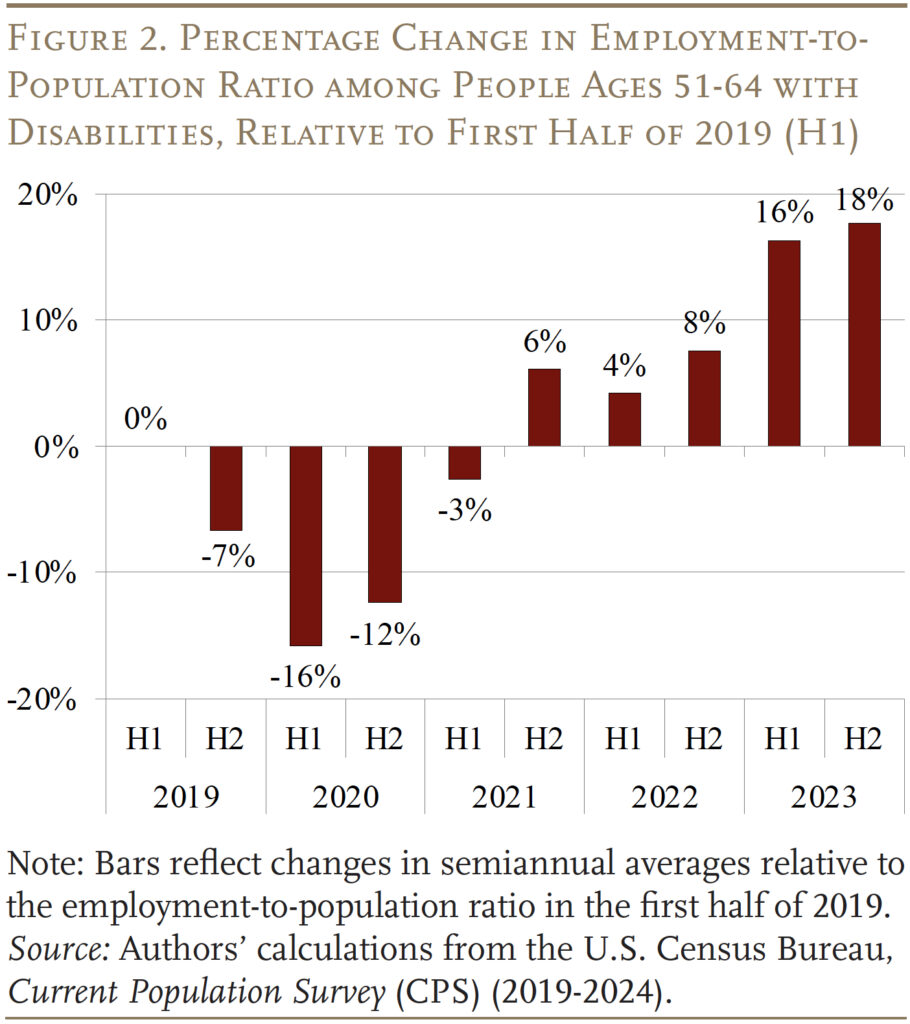
Two different post-pandemic developments, nonetheless, may be influencing employment. First, a better share of the working-age inhabitants now stories having a incapacity (see Determine 3). A lot of this improve may be attributed to an increase in self-reported cognitive impairments. Prior research recommend that these new impairments could be circumstances of “mind fog,” a situation associated to lengthy COVID.5 If lengthy COVID is the explanation, it may end in a shift within the composition of individuals with disabilities to these with greater work capability and larger attachment to the labor power.6 But, as proven in Determine 3, this argument is much less related for older employees, because the rise in incapacity is concentrated amongst youthful employees (ages 18-50).
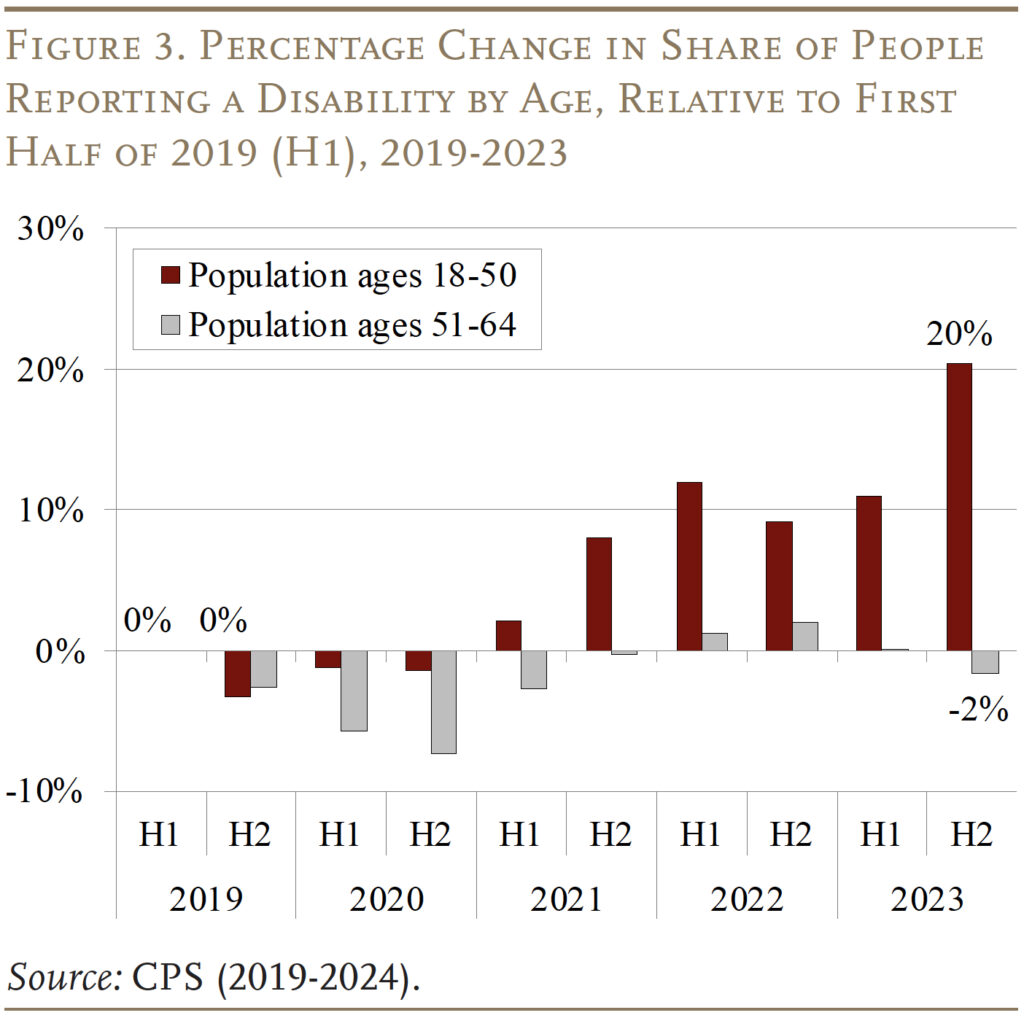
A second, extra convincing, issue is the weird tightness of the labor market in recent times, with the variety of job openings quickly outpacing the variety of unemployed job seekers (see Determine 4). In consequence, extra – and higher-paying – job alternatives have emerged for employees who historically face boundaries within the labor market.7 Within the case of employees with disabilities, employers could also be extra prepared to supply lodging akin to extra versatile hours and extra frequent breaks.
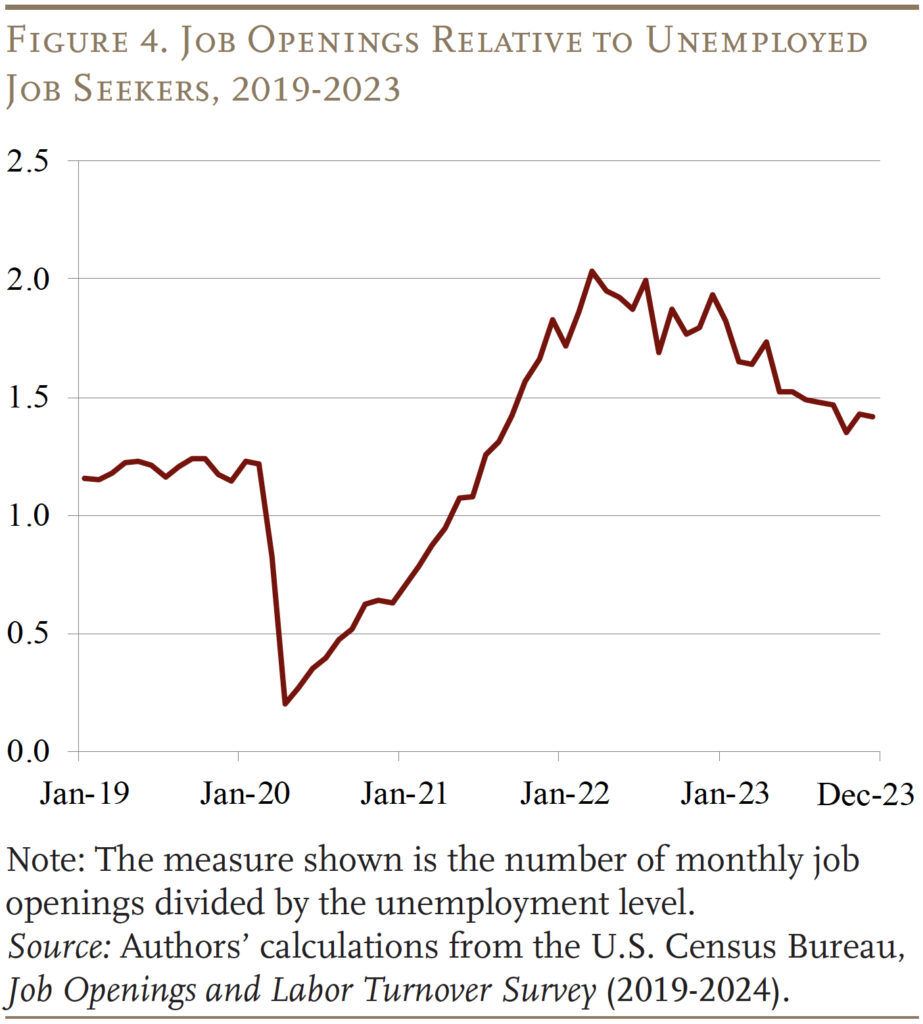
Whereas labor market tightness seems extra more likely to have an effect on employment charges amongst older employees with disabilities than the rising share of adults reporting a incapacity, the evaluation will take into account each components simply in case.
Information and Methodology
The evaluation relies on the 2012-2022 Well being and Retirement Research (HRS), a biennial longitudinal survey of older households with wealthy data on employees’ well being and employment. We give attention to people ages 51-64 who report a work-limiting well being situation and don’t take into account themselves absolutely retired.8
The evaluation then proceeds in three levels. The primary stage merely paperwork how the rising employment charge for older employees with disabilities breaks down by whether or not their occupation is amenable to distant work.9 If distant work has had an influence, then we’d anticipate the rise within the employment-to-population ratio of individuals in teleworkable jobs to be a lot bigger than the rise for these whose jobs will not be amenable to distant work.
This easy comparability, nonetheless, doesn’t take into account the potential results of different post-pandemic modifications. Therefore, the second stage estimates the chance of older folks with disabilities being employed in teleworkable and non-teleworkable occupations, controlling for employee well being and the tight labor market, along with fundamental demographics, utilizing the next equation:10
Employment in teleworkable (nonteleworkable) jobs = f(well being, labor market tightness, demographics, yr 2022)
The yr 2022 variable captures the change in teleworkable (non-teleworkable) employment in 2022 in comparison with 2018 – the omitted reference yr. If distant work has an essential impact on the employment charge – after accounting for employee well being and labor market tightness – then the coefficient on yr 2022 ought to be a lot bigger within the regression for teleworkable jobs than within the non-teleworkable regression.
The ultimate stage of the evaluation explores extra particularly how distant work helps older employees with disabilities keep within the labor power based mostly on their current work historical past, together with their expertise with teleworkable jobs. Particularly, it asks two questions: 1) did distant work persuade these on the sidelines to reenter work, or did it assist those that had been already working to delay exiting the labor power? and a pair of) was the influence restricted to those that had prior expertise with distant work, or did all employees profit? To reply these questions, the regression evaluation outlined above is repeated for subgroups of older folks with disabilities based mostly on whether or not they have labored prior to now 4 years and whether or not they have had prior expertise in a teleworkable job.11
Outcomes
This part begins by inspecting how distant work improved general employment for older folks with disabilities after which identifies which varieties of these employees noticed the best features.
How Did Distant Work Have an effect on Older Individuals with Disabilities?
To start out off, the evaluation merely breaks down the rise within the employment charge by whether or not the employee’s occupation is teleworkable, with out controlling for incapacity severity or labor market tightness. Per the CPS information in Determine 2, the rising employment in teleworkable occupations led to an 11.6-percent improve within the employment-to-population ratio of older folks with disabilities between 2018 and 2022, whereas non-teleworkable employment was nearly unchanged (see grey bars in Determine 5).12
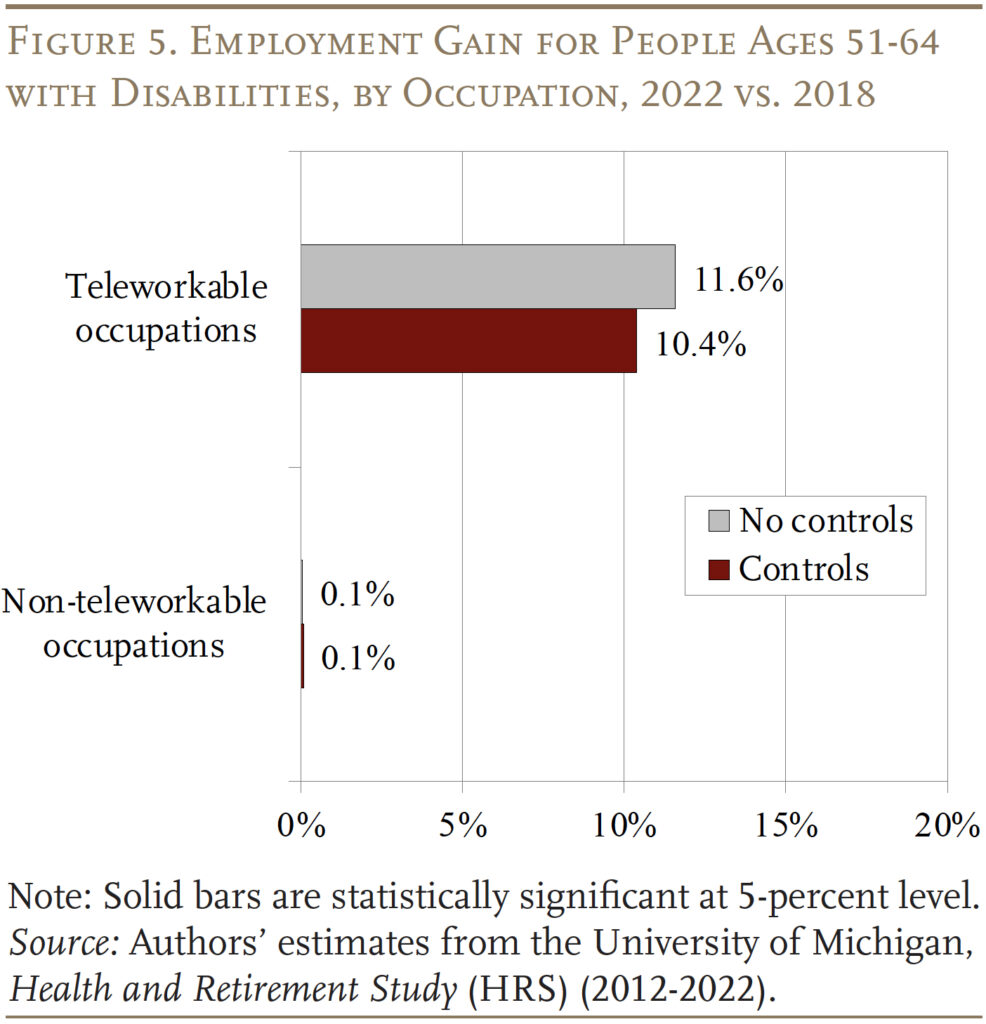
Shifting away from the uncooked comparisons, the regression outcomes present that distant work stays extraordinarily essential even after controlling for incapacity severity and labor market tightness (see prime crimson bar in Determine 5).13 Certainly, the purpose estimates barely change from the essential comparability, suggesting that the 2 doubtlessly confounding components have performed a much less essential function in rising employment for older folks with disabilities.14
Who Benefited the Most from Distant Work?
On condition that distant work has helped enhance employment outcomes for older employees with disabilities, the subsequent query is whether or not a few of them benefited greater than others. Determine 6 compares the share change within the employment charge for teleworkable occupations throughout 4 totally different teams of older employees with disabilities. These teams are decided based mostly on two points of their current work historical past. The primary side is whether or not or not they had been employed within the final 4 years, whereas the second is whether or not or not that they had prior expertise in teleworkable jobs.
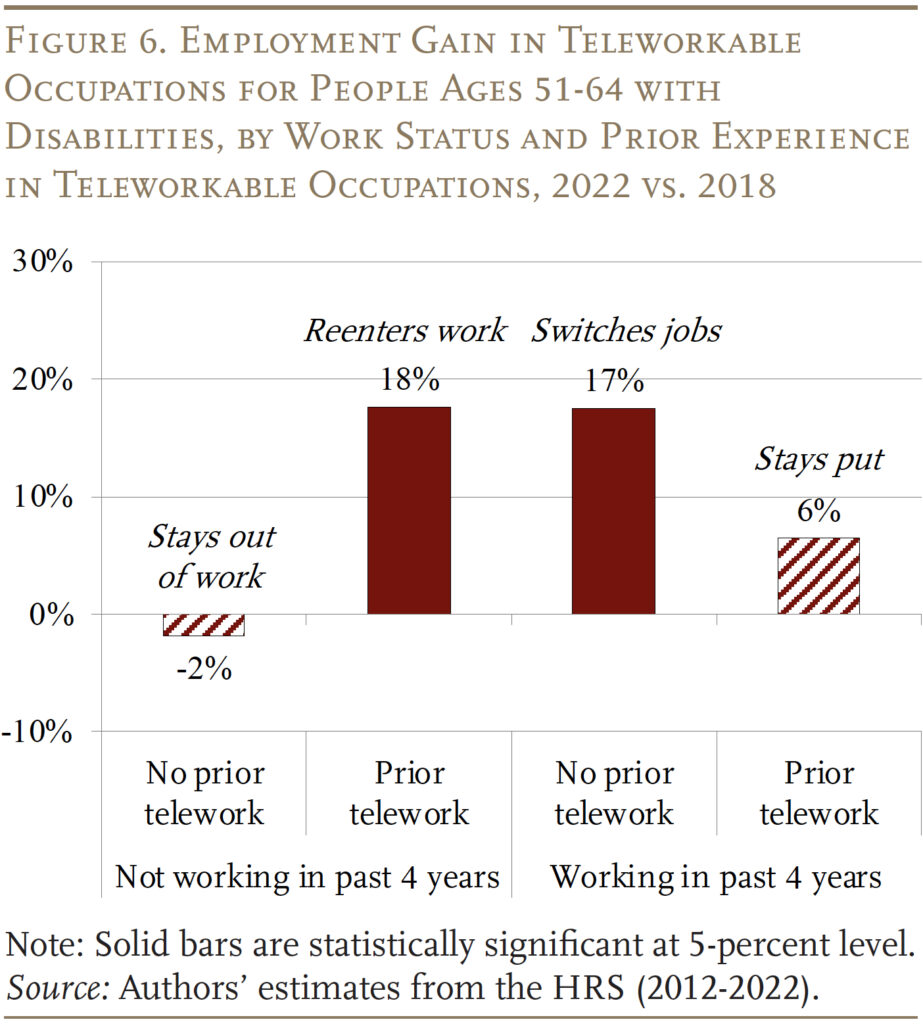
To know the story, take every end in flip. The primary group – those that haven’t labored prior to now 4 years and don’t have any expertise in teleworkable jobs – noticed no enchancment: they stayed out of labor. In distinction, the second group – who do have expertise in teleworkable jobs – noticed a big improve in employment, indicating that they had been higher ready to reenter work as distant jobs surged. The third group is probably most fascinating. Staff on this group have been employed not too long ago and, regardless of their lack of familiarity with telework, had been in a position to transfer into these jobs relatively than exiting the labor power due to their incapacity. Lastly, the fourth group – not too long ago working in teleworkable jobs – noticed much less profit from the shift to distant work, maybe as a result of that they had already acquired employer lodging previous to the pandemic, together with the power to telework.
Conclusion
The shift to distant work that began throughout COVID and has endured could have improved job prospects for older folks with disabilities by decreasing boundaries to employment. Per this view, this temporary finds that just about the entire post-pandemic employment acquire for older folks with disabilities has been in teleworkable occupations, and this sample holds even after controlling for different components. Distant work advantages older employees with disabilities by permitting some to reenter the labor power and others to modify jobs as a substitute of exiting work.
But, the extent to which these dynamics will persist over the long term stays an open query. This evaluation covers a interval when distant work was notably widespread. The supply of distant work could decline because the labor market eases again towards extra regular circumstances. And, the extent to which older employees with disabilities want or wish to work may also decline because the influence of bizarre pandemic-era circumstances – together with the momentary closure of Social Safety area places of work – subsides. Therefore, how distant work impacts older folks with disabilities ought to stay a subject of curiosity.
References
Barrero, Jose Maria, Nicholas Bloom, and Steven J. Davis. 2023. “The Evolution of Work from House.” Journal of Financial Views 37(4): 23-49.
Davis, Owen F., Laura D. Quinby, Matthew S. Rutledge, and Gal Wettstein. 2023. “How Did COVID-19 Have an effect on the Labor Pressure Participation of Older Staff within the First Yr of the Pandemic?” Journal of Pension Economics and Finance 22(4): 509-523.
Deitz, Richard. 2022. “Lengthy COVID Seems to Have Led to a Surge of the Disabled within the Office.” Liberty Avenue Economics. New York, NY: Federal Reserve Financial institution of New York.
Dingel, Jonathan I. and Brent Neiman. 2020. “How Many Jobs Can Be Performed at House?” Journal of Public Economics 189: 104235.
Domash, Alex and Lawrence H. Summers. 2022. “How Tight Are US Labor Markets?” Working Paper No. 29739. Cambridge, MA: Nationwide Bureau of Financial Analysis.
Gascon, Charles S. and Samuel Moore. 2024. “Are Staff with a Incapacity Dealing with New Alternatives or New Challenges?” On the Economic system Weblog. St. Louis, MO: Federal Reserve Financial institution of St. Louis.
Guo, Angela and Pawel M. Krolikowski. 2024. “Incapacity, Immigration, and Postpandemic Labor Provide.” Financial Commentary 2024-05. Cleveland, OH: Federal Reserve Financial institution of Cleveland.
Liu, Siyan and Laura D. Quinby. 2024. “Has Distant Work Improved Employment Outcomes for Older Individuals with Disabilities?” Working Paper 2024-12. Chestnut Hill, MA: Middle for Retirement Analysis at Boston Faculty.
Marks, Cassandra and Hannah Rubinton. 2024. “The Labor Results of Work from House on Staff with a Incapacity.” On the Economic system Weblog. St. Louis, MO: Federal Reserve Financial institution of St. Louis.
Ne’eman, Ari and Nicole Maestas. 2023. “How Has COVID-19 Impacted Incapacity Employment?” Incapacity and Well being Journal 16(2): 101429.
O’Trakoun, John. 2024. “Unsure Outlook for Disabled Employment.” Macro Minute. Richmond, VA: Federal Reserve Financial institution of Richmond.
College of Michigan. Well being and Retirement Research, 2012-2022. Ann Arbor, MI.
U.S. Census Bureau. American Time Use Survey, 2024. Washington, DC.
U.S. Census Bureau. Present Inhabitants Survey, 2019-2024. Washington, DC.
U.S. Census Bureau. Job Openings and Labor Turnover Survey, 2019-2024. Washington, DC.

